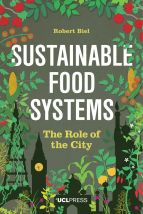Sustainable Food Systems: The Role of the City

Sustainable Food Systems: The Role of the City is concerned with how we can feed ourselves into the future, and with major aspects of climate adaptation and/or mitigation (page 1). It has a firm rooting in political ecology, as author Robert Biel examines how our food and farming model is inseparable from our socio-political system.
His critical narrative comprises 12 chapters. These take the reader on an intriguing journey that examines the roots of our unsustainable food and farming model under neo-imperialist capitalism and expounds a more sustainable model. It concludes by applying the discussion to the urban context, for example through biomimicry, urban agriculture and food-related networks. It is encouraging that Biel’s engagement with the topic is not only theoretical but also empirical, most obviously through his own urban allotment, from which he draws examples.
Biel identifies the capitalist food and farming model as one that simplifies and homogenizes nature and continually requires more inputs that are often based on fossil fuels. In contrast, he describes the characteristics of a new paradigm that embraces risk (as a necessary evolutionary opportunity for adaptation) and that is cautious of over-embracing equilibrium. Biel also promotes valuing complexity found in systems. Not only does the interdependence of systems offer the hope of win–win scenarios, but the complexity within systems (beyond the inputs and outputs of thermodynamics) offers potential through self-organization processes. He also emphasizes that more work or energy put into our food system is not the answer – in fact, he shows how less work can increase productivity as we spend more time developing knowledge and understanding of nature.
Through this book, Biel upholds that a real paradigm shift will only occur when both a more gradual change occurs in agriculture (due to our dependence on food) and a radical change occurs in the structure of society away from capitalism. Indeed, he argues that current efforts to make our food and farming system more sustainable have up until now failed because the socioeconomic interests of our current class system have resisted change.
Sustainable Food Systems: The Role of the City is an excellent resource for anyone interested in what unsustainable and sustainable food systems look like and the biological, socioeconomic and political complexities that support them. It is relevant reading for students, academics and practitioners as well as policymakers. Whilst it is possible to dip into its chapters independently, the greatest benefit is derived from reading the book as a whole. Each chapter builds upon the previous one and its arguments are given weight and substance by the discussions set forth in preceding chapters.
Available from:
http://www.ucl.ac.uk/ucl-press/browse-books/sustainable-food-systems-the...
Book note prepared by Hannah Keren Lee
Search the Book notes database
Our Book notes database contains details and summaries of all the publications included in Book notes since 1993 - with details on how to obtain/download.
Use the search form above, or visit the Book notes landing page for more options and latest content.
For a searchable database for papers in Environment and Urbanization, go to http://eau.sagepub.com/

